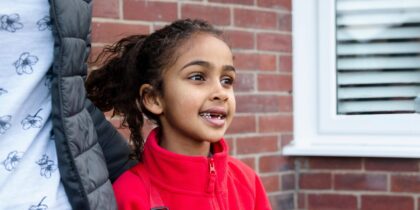The Government must overhaul the benefits system to tackle poverty and boost children’s mental health, according to a new report from Centre for Mental Health, Save the Children UK and the Children and Young People’s Mental Health Coalition.
A dual crisis says that living in poverty is having a “devastating” impact on children’s mental health across the UK. The report finds that inadequate levels of benefits and the use of sanctions are driving family poverty and damaging the mental health of both parents and children.
A dual crisis says that children are being failed by the state’s inability to combat the ‘dual crises’ of poverty and mental ill health. Based on research with parents and children, and a review of the evidence, the report notes that the number of children living in poverty has risen sharply to 4.3 million, alongside worrying rises in rates of mental health difficulties – 1 in 5 children and young people aged 8 to 25 now has a diagnosable mental health problem in the UK.
Existing evidence shows that the poorest children are four times more likely to have mental health difficulties than the wealthiest, by the age of 11. Taking action to lift families out of poverty would help bring down levels of mental distress, and improve mental health for millions of children and their parents.
This action must start with the benefits system. In the report, parents claiming Universal Credit describe the anxiety and stress caused by the assessment process, and their guilt at being unable to provide essentials like food and heating for their children. The report says that parents’ psychological distress has a knock-on impact on their children’s mental health.
A dual crisis finds that some children are ‘overexposed’ to the dual risks of poverty and poor mental health, with rates of poverty twice as high among Asian and Black families than for white families. The report says that this higher risk of poverty exacerbates the impacts of racism and discrimination on children’s mental health.
The charities are calling on the Government to deliver on its manifesto pledge of a comprehensive and effective child poverty strategy, and for it to go hand-in-hand with a cross-government mental health plan. They welcome the Government’s manifesto promise to put a mental health professional in every school. But they warn that without decisive action to eradicate child poverty, including ending the two-child benefits limit, more children will experience avoidable harm and distress.
Rebecca, a parent we spoke to as part of this research, said: “My daughter has been waiting for CAMHs [Child and Adolescent Mental Health Services] since January 2021. It’s July 2024. When we called up it was acute, I keep calling them and she’s at the top of the list as emergency acute care and still they don’t see her. We’ve not been able to access any more support. I’ve not been able to pay for a private therapist for her.”
Andy Bell, chief executive at Centre for Mental Health, said: “Poverty casts a shadow over a child’s mental health, and it’s a shadow that can last a lifetime. Effective action from the Government can start to turn this around. Protecting children and families from poverty and its ill effects on their lives is not just good for the economy. It’s a health intervention, and a vital one at that. For a mission-led Government, it will open the door to improved child health, preventing illness, boosting business, and strengthening communities.”
Amy Whitelock Gibbs, Chair of the Children and Young People’s Mental Health Coalition, said: “Mental health and child poverty are inextricably linked. It is no coincidence that rates of mental health difficulties in children and young people and rates of child poverty have risen in tandem over recent years and are now both at their highest levels in a decade. The new Government must confront this reality and take action now to tackle child poverty as a root cause of mental health problems, by publishing both a child poverty strategy and a mental health strategy.”
Priya Edwards, policy and advocacy adviser at Save the Children UK, said: “A childhood blighted by poverty and poor mental health leads to dreadful outcomes for young people that sadly impacts them for the rest of their life. Families deserve better than constant anxiety about making ends meet. Immediate action the UK Government should take would be to support the most vulnerable families by introducing a ’child lock’. This would lock social security entitlements each year by average earnings or inflation, whichever of the two is higher. Parents would get greater financial stability, easing the stress and anxiety of financial hardship for the entire family.”







